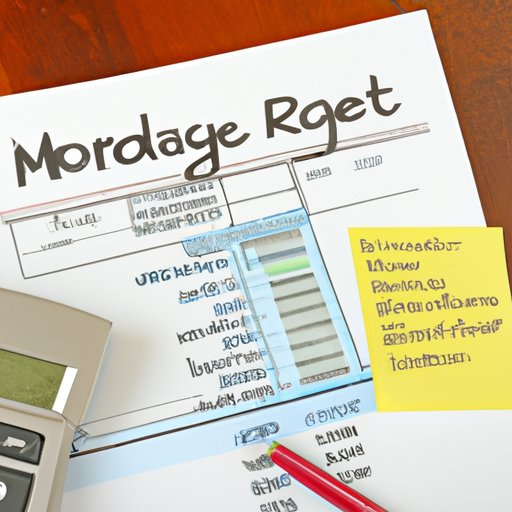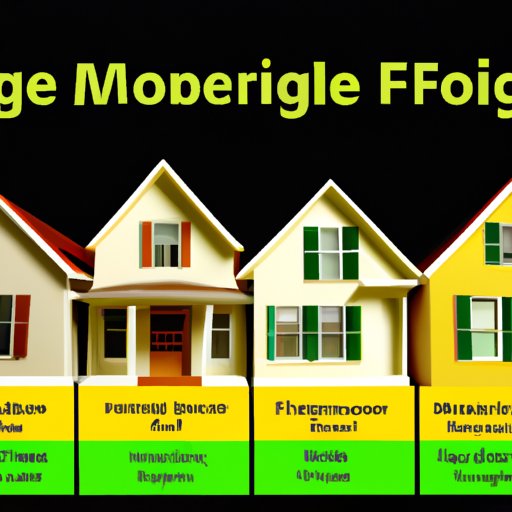Introduction
Buying a home is an exciting yet intimidating experience. One of the most important decisions you will make during this process is determining how much you can afford to spend on a mortgage. Knowing your maximum mortgage amount can help you avoid taking on too much debt and ensure that you are able to comfortably make payments on your loan.
Calculating Your Mortgage Affordability: How Much Home Can You Buy?
Mortgage affordability is the amount of money you can borrow while still being able to make your monthly payments. The amount you can afford depends on several factors including your income, debt, credit score, and other financial obligations. Here’s a closer look at how to determine your maximum mortgage amount.
Understanding Your Maximum Mortgage Amount
Your maximum mortgage amount is determined by two factors: your income and your debt-to-income ratio (DTI). Your total income should be enough to cover the cost of your mortgage payment, taxes, insurance, and any other expenses you may have. Your DTI ratio is the percentage of your income that goes towards paying off debt. Generally, lenders prefer borrowers with a DTI ratio of 36% or less.
Exploring Factors That Affect Your Mortgage Affordability
In addition to your income and DTI ratio, there are several other factors that can affect your ability to qualify for a mortgage. Your credit score is one of the most important factors, as it reflects your financial responsibility and can determine whether you qualify for certain loan programs. Additionally, the size of your down payment, current interest rates, and other financial obligations can all affect your maximum mortgage amount.

Tips for Determining Your Mortgage Budget
Once you understand how much you can afford to spend on a mortgage each month, you can start to create a budget. Here are some tips for determining your mortgage budget.
Estimate Your Monthly Mortgage Payment
Start by estimating your monthly mortgage payment. This calculation should include principal, interest, taxes, and insurance. You can use online calculators to help you figure out the estimated monthly payment for the size of loan you are considering. This will give you a better idea of what you can realistically afford.
Consider Your Down Payment
Your down payment can also play a role in determining your maximum mortgage amount. A larger down payment means you can borrow more money, but it also means you will have less cash available for other expenses. Consider how much you can realistically afford to put down and then adjust your loan amount accordingly.
Analyze Your Debt-to-Income Ratio
Your debt-to-income ratio is an important factor in determining your maximum mortgage amount. Lenders generally prefer borrowers with a DTI ratio of 36% or less. To improve your DTI ratio, consider paying off some of your existing debt or increasing your income.
Review Your Credit Score
Your credit score is another important factor in determining your maximum mortgage amount. The higher your credit score, the easier it will be to secure a loan. If your credit score is lower than you’d like, take steps to improve it before applying for a mortgage.
Strategies for Staying Within Your Mortgage Budget
Once you know how much you can afford to spend on a mortgage, it’s important to stay within your budget. Here are some strategies for keeping your spending in check.
Set a Realistic Budget
Before you start house hunting, set a realistic budget. Don’t stretch yourself too thin financially. Make sure you have enough money left over each month to cover other expenses such as food, utilities, and entertainment.
Save Up for a Larger Down Payment
Making a larger down payment can help you borrow more money and reduce your monthly payments. If you can, try to save up as much as you can for a larger down payment so you can get the best deal possible.
Consider Adjustable Rate Mortgages
Adjustable rate mortgages (ARMs) offer lower interest rates than fixed-rate mortgages. However, they come with the risk of rising interest rates over time. If you think you might need to move soon, an ARM could be a good option since you won’t be stuck with the same rate for the life of the loan.
How to Make Sure You Don’t Bite Off More Than You Can Chew with Your Mortgage
It’s important to make sure you don’t take on more debt than you can handle. Here are some tips for making sure you don’t bite off more than you can chew with your mortgage.
Understand Your Financing Options
Take the time to research your financing options. Consider different loan types, interest rates, and other factors to make sure you are getting the best deal possible.
Research Different Mortgage Types
There are many different types of mortgages available. Do your research to find the one that best suits your needs. Talk to different lenders and compare their offers to make sure you are getting the best deal.
Ask for Help from Professionals
If you are feeling overwhelmed by the process, don’t hesitate to seek help from a professional. A real estate agent or mortgage broker can provide valuable advice and guidance to help you make the right decision.
Conclusion
Getting a mortgage can be a daunting task. Knowing your maximum mortgage amount is essential for avoiding taking on too much debt and ensuring that you can comfortably make payments on your loan. Calculate your maximum mortgage amount by understanding your income, debt-to-income ratio, credit score, and other factors. Create a realistic budget and consider saving up for a larger down payment. Finally, do your research and ask for help from professionals if needed. By following these tips, you can ensure that you stay within your budget and avoid biting off more than you can chew with your mortgage.
(Note: Is this article not meeting your expectations? Do you have knowledge or insights to share? Unlock new opportunities and expand your reach by joining our authors team. Click Registration to join us and share your expertise with our readers.)
